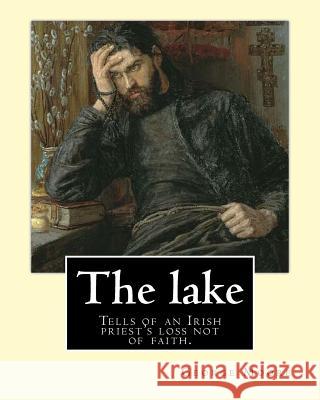The lake. By: George Moore and William Heinemann: Tells of an Irish priest's loss not of faith, but of commitment to the principles » książka
The lake. By: George Moore and William Heinemann: Tells of an Irish priest's loss not of faith, but of commitment to the principles
ISBN-13: 9781540794512 / Angielski / Miękka / 2016 / 132 str.
The lake. By: George Moore and William Heinemann: Tells of an Irish priest's loss not of faith, but of commitment to the principles
ISBN-13: 9781540794512 / Angielski / Miękka / 2016 / 132 str.
(netto: 33,72 VAT: 5%)
Najniższa cena z 30 dni: 35,11
ok. 16-18 dni roboczych
Bez gwarancji dostawy przed świętami
Darmowa dostawa!
Tells of an Irish priest's loss not of faith, but of commitment to the principles fostered in him during his training. It describes his discovery of a more fulfilling religion that celebrates instinct as being man's true mode of communion with his soul, and is also about the satisfactions of living close to nature in Ireland. The atmosphere of the Mayo countryside and the rich historical associations in every church, castle, or abbey, ruin and farmstead, are evoked with a rare skill, subtly illuminating the relationship that Moore takes as his theme between place and the Irish personality. ................ George Augustus Moore (24 February 1852 - 21 January 1933) was an Irish novelist, short-story writer, poet, art critic, memoirist and dramatist. Moore came from a Roman Catholic landed family who lived at Moore Hall in Carra, County Mayo. He originally wanted to be a painter, and studied art in Paris during the 1870s. There, he befriended many of the leading French artists and writers of the day. As a naturalistic writer, he was amongst the first English-language authors to absorb the lessons of the French realists, and was particularly influenced by the works of Emile Zola.His writings influenced James Joyce, according to the literary critic and biographer Richard Ellmann, and, although Moore's work is sometimes seen as outside the mainstream of both Irish and British literature, he is as often regarded as the first great modern Irish novelist.George Moore was born in Moore Hall in 1852. As a child, Moore enjoyed the novels of Walter Scott, which his father read to him. He spent a good deal of time outdoors with his brother, Maurice George Moore, and also became friendly with the young Willie and Oscar Wilde, who spent their summer holidays at nearby Moytura. Oscar was to later quip of Moore: "He conducts his education in public." His father had again turned his attention to horse breeding and in 1861 brought his champion horse, Croagh Patrick, to England for a successful racing season, together with his wife and nine-year-old son. For a while George was left at Cliff's stables until his father decided to send George to his alma mater facilitated by his winnings. Moore's formal education started at St. Mary's College, Oscott, a Catholic boarding school near Birmingham where he was the youngest of 150 boys. He spent all of 1864 at home, having contracted a lung infection brought about by a breakdown in his health. His academic performance was poor while he was hungry and unhappy. In January 1865, he returned to St. Mary's College with his brother Maurice, where he refused to study as instructed and spent time reading novels and poems.That December the principal, Spencer Northcote, wrote a report that: "he hardly knew what to say about George." By the summer of 1867 he was expelled, for (in his own words) 'idleness and general worthlessness', and returned to Mayo. His father once remarked, about George and his brother Maurice: "I fear those two redheaded boys are stupid," an observation which proved untrue for all four boys............William Henry Heinemann (18 May 1863 - 5 October 1920) was the founder of the Heinemann publishing house in London. Heinemann was born in 1863, in Surbiton, Surrey, the eldest son of Louis Heinemann, a director of Parr's Bank & native of Hanover, Germany, and his Lancashire born wife Jane Lavino. 1] Both his parents were Jewish by descent, although they had been Anglican for two generations. In his early life he wanted to be a musician, either as a performer or a composer, but, realising that he lacked the ability to be successful in that field, he took a job with the music publishing company of Nicolas Trubner.When Trubner died, Heinemann founded his own publishing house in Covent Garden in 1890. The company published many translations of the classics in Great Britain as well as publishing such authors as H. G. Wells, Robert Louis Stevenson, Rudyard Kipling and Sylvia Plath..."
Zawartość książki może nie spełniać oczekiwań – reklamacje nie obejmują treści, która mogła nie być redakcyjnie ani merytorycznie opracowana.











